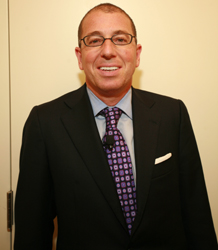For years, developer Joe Sitt and Mayor Mike Bloomberg locked horns over the fate of Coney Island. The mayor wanted to add more rides in the amusement park section of the beachside Brooklyn enclave. But Sitt, who owned much of the area, imagined pairing any rides with flashy hotels, apartments and shops.
Today, in the Blue Room of City Hall, though, the former adversaries were all praise and smiles.
Under a plan hammered out after years of negotiation, the city will buy 6.9 acres of Coney Island land for $95.6 million. Sitt, the chairman and chief executive of Thor Equities, meanwhile, will scale back his mega-project to adjacent parcels, which the city had recently rezoned to allow for higher-density development.
“I always thought that a good negotiation should leave both sides satisfied, but not totally,” said Mayor Bloomberg while flanked by local and national politicians, as well as zoning and economic-development officials.
Explaining that downturns are ideal times to invest, and that missing the chance to buy now would be tantamount to allowing the destruction of the old Pennsylvania Station, Bloomberg added that he hopes now rundown Coney Island could someday rival tourist attractions like Times Square.
“This really is a win, win, win for everybody,” said Bloomberg, adding that the city will spend $150 million on boardwalk improvements and other upgrades.
For his part, Sitt, the founder of Ashley Stewart, a plus-size clothing chain, who controls 12 million square feet of stores, hotel and apartment buildings nationwide, downplays the sale’s financial gains.
Instead, he wants to emphasize an alliance that will help preserve a city icon he used to visit as a child, according to an interview he gave to The Real Deal afterward.
You have squabbled with the city over this land since 2005, when you began to buy it. Over that time, the surviving amusement park section shrunk to a shell of its former self. How does it feel for this deal to be completed?
Yes. It feels really good, because when you work hard, you want to see something moving forward. This is an incredible opportunity to be partners with the city government to create one of the most talked about real-estate development in the United States in decades.
Initially, your plan called for a $1.5 billion mix of time-share hotels and a glass-enclosed water park, in what many compared with Las Vegas. Now that you will be squeezed into a smaller plot, what will it be? Will it look like the old renderings?
We have to redo all of our plans, but we will still have millions and millions of square feet of apartments and hotels and retail and restaurants and enclosed amusements. Yes, it will still have the Las Vegas component to it. The latter versions of the renderings are close to what it will be.
Earlier this year, the city offered to buy 10.45 acres of your holdings there for $105 million, which works out to about $229 a square foot. Now, the city has paid $320 a foot. That’s a big increase. And that’s close to what Manhattan land sold for at the peak. How did you do it?
Today’s focus is not about the dollars. I’m happy, but that’s not my main focus. My happiness is having a partner in the city of New York and a commitment of dollars to getting something done there.
Is there any lingering animosity between you and the city?
We all got know each other personally, which we hadn’t done before. From that comes mutual respect. But last but not least, we have the same goals. Everybody came together with the same mission and same goal.
What about getting the money to actually build something on the scale of what you’ve proposed, in a recession?
What makes it all work is that the city has lot of work to do before I start taking the helm, in terms of infrastructure work. Mine comes second, so the odds are, when I’m at bat, the recession will be long gone.
One argument for Coney Island’s viability is that people are now taking vacations closer to home. Do you agree?
Yes. Times will get good again, and times will get bad again, but I think it’s important to get Coney Island built to accommodate people who can’t afford the long vacation. And, to get ready for the next cycle.
Coney Island isn’t nearly as popular as it was a century ago, when there were three amusement parks here. Do people still feel a connection to it?
This is probably the most iconic thing we have in New York City. I’ve also gotten letters from all over the world about it. There’s a lot of interest in this place.
When you were growing up nearby, did you go there? Have you been back in recent years with your own family?
Yes. My favorite was eating junk food at the beach. And I have been back, all the time. The beach there is phenomenal.
